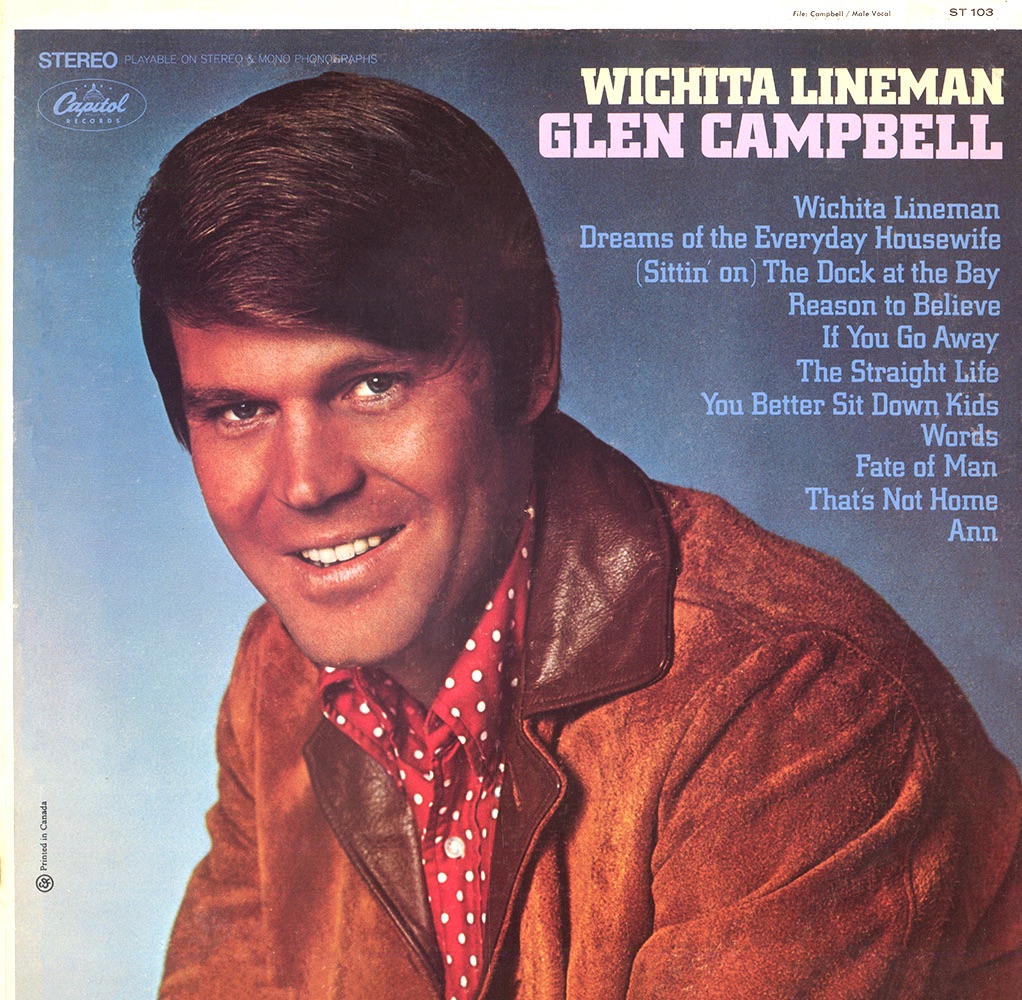
The title track of this LP is one of my favourite songs. I have no idea why. I’ve just always liked it. It has always sounded great to my ears and I think it still stands up. The rest of this LP is decent enough, if somewhat muzak-y in places, the kind of stuff my parents would have listened to in the late 1960’s at a cocktail party. Some of the songs on the record are, by today’s standards, unintentionally comic. The Straight Life would almost certainly have a different title today (or it would be about something else entirely) and Dreams Of The Everyday Housewife would, without doubt, be frowned upon by today’s liberated female, especially one without a sense of humour. You know - Karen. She wouldn't like this record just because of that one song. In a way, it's a time capsule of a very different time, and just because of that it’s still worthy of the occasional spin - even after 50 years.
One of the many achievements of Glen Campbell's career is the fact that his first seven albums all went to number one on Billboard’s country chart. But only one - this record - made it to the top of the pop charts, in November, 1968. It stayed there for five weeks - not as long as the 20 weeks it stayed on the country charts, though - and it was the only one of Campbell's records to be certified double platinum (two million copies sold). It was eventually toppled off the charts by another record - Campbell's own Galveston LP, which he recorded after Wichita Lineman.
The album is best known for the title track, which was written by Jimmy Webb. I just love that song, which was released as the second single from the LP. The first single was the above-mentioned Chris Gantry-penned song, Dreams Of The Everyday Housewife, which only reached number three on the country charts and 32 on the pop charts - which is a pretty impressive achievement for such a shitty song (sorry Glen).
The album featured top-tier session players Carol Kaye, Hal Blaine and Jim Gordon, and featured Campbell’s familiar mix of elegantly-orchestrated country-pop numbers. Many of them were covers of other people's hits, such as the Bee Gees’ Words and Sonny & Cher’s You’d Better Sit Down, Kids, which is so bad it's actually great. There's also a worthy interpretation of Otis Redding's (Sittin’ On) The Dock of the Bay.
But it was the title track that reeled me in, and I'm sure it was the same for everybody else, too. Musically it's just one of those unintended songs that, in anybody else's hands, might not have worked at all. A simple tale of a lonely telephone repairman working on the open plains of the American Midwest, Wichita Lineman really is one of the most perfectly realized pop songs of all time. Campbell said that when he first heard the song he cried.
Jimmy Webb recalled, in a BBC Radio 2 documentary, how he wrote the song. "They called me and said, 'Can you write us a song about a town?' And I said, 'I'm not sure I want to write a song about a town right now. I think I've overdone that'."
But he wrote it anyway, and he laughed as he related the circumstances around its writing and how he was living in a sort of communal environment at the time with 25 or 30 of his best friends. "There were a couple of clowns who came into my music room and spray-painted my piano green, I think, because of the lyrics to MacArthur Park - 'All the sweet, green icing flowing down'. They thought it was pretty funny. So I spent the afternoon trying not to brush up against the piano and writing a song at the same time. That whole afternoon was a comedy, with a sticky green piano and several desperate calls from the recording studio."
As for the lineman in the song, Webb said he "just tried to take an ordinary guy and open him up and say, 'Look there's this great soul, and there's this great aching, and this great loneliness inside this person and we're all like that. We all have this capacity for these huge feelings'."
While Webb worked on the lyrics, Campbell and his producer, Al DeLory, were getting impatient. "They said, 'We're really in a hurry, send it over'. And I said, 'OK, but the third verse I don't have'." But what Webb didn't know was that DeLory's uncle had actually been a lineman in Kern County, California, so it didn't matter. They had someone to reference for inspiration, and that connection fuelled the recording process and is probably the invisible magic dust that helped make the song so special.
Campbell cut the song with musicians from The Wrecking Crew, a group of L.A. musicians renowned for their playing on so many records of the era, including the first few Monkees' albums and The Byrds' cover of Bob Dylan's Mr Tambourine Man.
This record can usually be found in any used record store, and they'll probably pay you a couple of bucks to take it off their hands.
The title track of this LP is one of my favourite songs. I have no idea why. I’ve just always liked it. It has always sounded great to my ears and I think it still stands up. The rest of this LP is decent enough, if somewhat muzak-y in places, the kind of stuff my parents would have listened to in the late 1960’s at a cocktail party. Some of the songs on the record are, by today’s standards, unintentionally comic. The Straight Life would almost certainly have a different title today (or it would be about something else entirely) and Dreams Of The Everyday Housewife would, without doubt, be frowned upon by today’s liberated female, especially one without a sense of humour. You know - Karen. She wouldn't like this record just because of that one song. In a way, it's a time capsule of a very different time, and just because of that it’s still worthy of the occasional spin - even after 50 years.
One of the many achievements of Glen Campbell's career is the fact that his first seven albums all went to number one on Billboard’s country chart. But only one - this record - made it to the top of the pop charts, in November, 1968. It stayed there for five weeks - not as long as the 20 weeks it stayed on the country charts, though - and it was the only one of Campbell's records to be certified double platinum (two million copies sold). It was eventually toppled off the charts by another record - Campbell's own Galveston LP, which he recorded after Wichita Lineman.
The album is best known for the title track, which was written by Jimmy Webb. I just love that song, which was released as the second single from the LP. The first single was the above-mentioned Chris Gantry-penned song, Dreams Of The Everyday Housewife, which only reached number three on the country charts and 32 on the pop charts - which is a pretty impressive achievement for such a shitty song (sorry Glen).
The album featured top-tier session players Carol Kaye, Hal Blaine and Jim Gordon, and featured Campbell’s familiar mix of elegantly-orchestrated country-pop numbers. Many of them were covers of other people's hits, such as the Bee Gees’ Words and Sonny & Cher’s You’d Better Sit Down, Kids, which is so bad it's actually great. There's also a worthy interpretation of Otis Redding's (Sittin’ On) The Dock of the Bay.
But it was the title track that reeled me in, and I'm sure it was the same for everybody else, too. Musically it's just one of those unintended songs that, in anybody else's hands, might not have worked at all. A simple tale of a lonely telephone repairman working on the open plains of the American Midwest, Wichita Lineman really is one of the most perfectly realized pop songs of all time. Campbell said that when he first heard the song he cried.
Jimmy Webb recalled, in a BBC Radio 2 documentary, how he wrote the song. "They called me and said, 'Can you write us a song about a town?' And I said, 'I'm not sure I want to write a song about a town right now. I think I've overdone that'."
But he wrote it anyway, and he laughed as he related the circumstances around its writing and how he was living in a sort of communal environment at the time with 25 or 30 of his best friends. "There were a couple of clowns who came into my music room and spray-painted my piano green, I think, because of the lyrics to MacArthur Park - 'All the sweet, green icing flowing down'. They thought it was pretty funny. So I spent the afternoon trying not to brush up against the piano and writing a song at the same time. That whole afternoon was a comedy, with a sticky green piano and several desperate calls from the recording studio."
As for the lineman in the song, Webb said he "just tried to take an ordinary guy and open him up and say, 'Look there's this great soul, and there's this great aching, and this great loneliness inside this person and we're all like that. We all have this capacity for these huge feelings'."
While Webb worked on the lyrics, Campbell and his producer, Al DeLory, were getting impatient. "They said, 'We're really in a hurry, send it over'. And I said, 'OK, but the third verse I don't have'." But what Webb didn't know was that DeLory's uncle had actually been a lineman in Kern County, California, so it didn't matter. They had someone to reference for inspiration, and that connection fuelled the recording process and is probably the invisible magic dust that helped make the song so special.
Campbell cut the song with musicians from The Wrecking Crew, a group of L.A. musicians renowned for their playing on so many records of the era, including the first few Monkees' albums and The Byrds' cover of Bob Dylan's Mr Tambourine Man.
This record can usually be found in any used record store, and they'll probably pay you a couple of bucks to take it off their hands.


